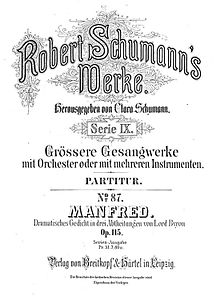Manfred (Schumann)
Manfred. Dramatic poem in three sections op. 115 is a play music by Robert Schumann . The work is based on the poem Manfred by Lord Byron and consists of an overture , an entracte , melodramas , various solo numbers and choirs.
History of origin
Schumann had already read Byron's poetry Manfred as a young student . He wrote about this in his diary on March 26, 1829: Bettlectüre: Manfred v. Byron - terrible night. But it was not until 1848 that Schumann used the German translation by Karl Adolf Suckow , which he had met through his mother-in-law Mariane Bargiel, for his composition . Suckow thought from the start of setting it to music and wrote in his introduction that it would now “depend on Manfred finding a composer who does not lag behind the content in order to bring out the incomparably great importance that he has for the Reformation of the theater is destined to win. ”Then it says:“ And this is you, Mr. Felix Mendelssohn Bartholdy ; I will direct the attack of my wishes directly on you without further detours, and I will see to it that this book as their testimony comes into your hands soon. ”It is not known whether Mendelssohn actually received the book.
Schumann began composing on August 4, 1848 in Dresden , where he was living at the time. On December 4, 1848, his mother-in-law Mariane Bargiel wrote to her son Woldemar Bargiel : “ Clara writes me a lot about Robert's work; he really got involved with Manfred von Byron, whom I brought with me from Altheyde , worked on it dramatically and was already busy composing it; that makes me happy; but nobody should know anything about it, so quietly about it! ”In 1851/52 Schumann subjected the work in Düsseldorf to a thorough revision. It is structured as follows:
- overture
-
I. Department
- 1. Song of the spirits. "Your commandment pulls me out"
- 2. Appearance of a magic picture. "Oh God, is it so if you are not delusional"
- 3. Banished Spirits. "When the moon is on a silent wave" (four bass voices)
- 4. Alpenkuhreigen. "Listen, the sound!"
-
II. Department
- 5. Between act music
- 6. Calling the Alpenfee. "You beautiful ghost with your hair"
- 7. Hymn of the Spirits of Ariman's. "Heil our master!" (Choir)
- 8th choir. "Throw yourself in the dust"
- 9th choir. "Crushes the worm"
- 10. Summoning the Astarte. "Shadow! Ghost! Whatever you are "
- 11. Manfred's address to Astarte. “O hear, hear me. Astarte! "
-
III. Department
- 12. "Peace came upon me"
- 13. Farewell to the sun. "Glorious Disk"
- 14. "Just look here"
- 15. Final scene. Monastery chant. "Requiem aeternam" (choir)
The composer considered the form of the work to be completely new and wrote to Franz Liszt on November 5, 1851 : “Yesterday we tried the overture to Manfred; my old love for poetry has reawakened as a result. How nice if we could show people the tremendous testimony of the highest poetic power! They gave me hope; have you ever thought about it again? "[...]" The whole thing shouldn't be announced to the audience as an opera or a singspiel or melodrama , but as a "dramatic poem with music" - it would be something completely new and unheard of. "
The first performance of the overture took place on March 14, 1852 in the Leipzig Gewandhaus under Schumann's direction. The first performance of the entire work took place - in scenic form - on June 13, 1852 in the Weimar court theater under the direction of Franz Liszt. Directed by Eduard Genast . Schumann could not take part.
literature
- Hugo Botstiber : Robert Schumann. Music to Byron's Manfred. Op. 115. Seemann Nachf., Leipzig [1901]
- Arnfried Edler : Landscape and Myth in Manfred von Byron and Schumann . In: Festschrift Klaus Hortschansky for his 60th birthday. Edited by Axel Beer and Laurenz Lütteken . Schneider, Tutzing 1995, ISBN 3-7952-0822-X , pp. 401-412
- Jochen Clement: Reading Drama and Drama Music. On Schumann's Manfred op.115 . In: Schumann Studies 5 (1996), pp. 143–152.
- Martin Geck : Robert Schumann. Man and musician of romanticism. Siedler, Munich 2010, ISBN 978-3-88680-897-7 , pp. 277–283.
- Margit L. McCorkle : Robert Schumann. Thematic-bibliographical catalog raisonné. Henle, Munich / Mainz 2003, pp. 482–491.
- Laura Tunbridge: Schumann's Manfred in the mental theater. In: Cambridge Opera Journal , Vol. 15 (2003), pp. 153-183.
- Ulrich Tadday (ed.): Schumann manual. Metzler, Kassel and Bärenreiter, Stuttgart / Weimar 2006, ISBN 978-3-476-01671-3 , p. 512f.
Individual evidence
- ↑ Spelling of the diary entry quoted from Martin Geck: Robert Schumann. Man and musician of romanticism. Siedler, Munich 2010, p. 278
- ↑ "Posgaru" [= Karl Adolf Suckow], Byron's Manfred. Introduction, translation and notes. A contribution to the criticism of contemporary German dramatic art and poetry , Breslau 1839. The copy of Schumann (signature 6064-A4 / C1) preserved in the Robert-Schumann-Haus in Zwickau with pencil entries by Mariane Bargiel came from a visit to Elisabeth Werner's mother in 1848 Amalie Werner brought along.
- ^ Eberhard Möller (ed.), Robert and Clara Schumann's correspondence with the Bargiel family (= Schumann-Briefedition , Series I, Volume 3), Cologne: Dohr 2011, p. 94
- ↑ Walter Dahms: Schumann , Schuster & Löffler, Berlin, 1916, p. 198, ( Google Books in Archive.org )
- ^ Robert and Clara Schumann's correspondence with Franz Brendel , Hermann Levi , Franz Liszt , Richard Pohl and Richard Wagner , ed. by Thomas Synofzik , Axel Schröter and Klaus Döge (= Schumann-Briefedition , Series II, Volume 5), Cologne: Dohr 2014, p. 168
